Primary navigation
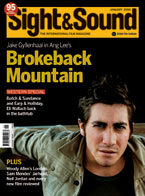
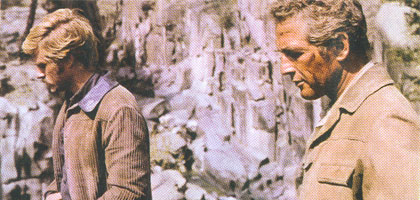
Western special: Brokeback Mountain is only the latest in a long tradition of Westerns to explore the intense, unspoken and physical bonds between its two male heroes. By Edward Buscombe
It has become almost a commonplace to suggest that the strong, often intense relationships between men in the Western are a covert form of homosexuality. Surely, the insinuation goes, if men are so wrapped up in each other there must be more to it than affection and respect. Robin Wood called the young men who people Howard Hawks' Westerns "gay male icons… carrying the constant (if constantly submerged) impression of being an alternative to the woman." In this view the women in Westerns are merely a smokescreen; the real emotional action is between the men.
Not surprisingly, gay male pornography has exploited this suggestion along with the sexual appeal of the cowboy costume: the close-fitting leather chaps, the high-heeled, decorated boots, the low-slung gunbelt buckled across the crotch, not to mention the phallic charge of the gun. Andy Warhol's Lonesome Cowboys (1968) camps it up, with pretty boys discussing make-up and hairstyles and the best way to wear six-guns if you want to improve the appearance of your bottom.
In the mainstream, Westerns no less than other genres almost invariably provide a woman for the hero to tangle with, but directors are divided as to her importance. Anthony Mann insisted that "without a woman the Western wouldn't work." And Budd Boetticher remarked: "She is the one… who makes him act the way he does. [But] in herself the woman has not the slightest importance." In such a reading the hero may be motivated by 'manly' virtues of self-respect and justice but what drives him on is the vision of finding a place and settling down, and for that he needs a woman.
What is beyond dispute is that the world of the Western is characterised by a hyper-masculinity. In West of Everything Jane Tompkins has argued that this is a reaction to the perceived feminisation of culture in the late-Victorian era, provoking a renewed emphasis on manliness in such influential figures as Teddy Roosevelt and Owen Wister, author of The Virginian (1902). Central to this conception of masculinity is the notion that real men don't talk, they act: if emotions are expressed they are of anger or hatred and love cannot be readily articulated. For this reason it is easy to assume either that love is absent (where women are concerned), or that if present it is the love that dares not speak its name.
Of course this is a travesty. There are plenty of garrulous heroes in the Western. Perhaps what separates these men from their women more is the overriding importance of physical strength and courage in the genre: neither in the 19th-century setting of the films nor in the period when most of the best ones were made (roughly 1945-70) can women be envisaged as performing the riding, shooting and fistfights the Western calls for.
All of which is not to say that gay subtexts don't exist. Didn't Rock Hudson appear in a dozen Westerns? But there's surely an irony in the fact that the very thing that now makes a fully fledged gay Western a possibility is what virtually killed off the genre in the first place. Many factors may have hastened the Western's demise but undoubtedly a major cause was the challenge mounted in the 1960s to traditional sexual roles and stereotypes. Once the phrase 'A man's gotta do what a man's gotta do' could only be uttered tongue-in-cheek, once women no longer saw themselves as heroines who would wait patiently on the sidelines until their men returned from the fray and once homosexuality could be openly discussed and practised, the Western was undermined, perhaps fatally. Of course the West is still there - as a place, an image, an idea - but it's not the same idea. Now, if femininity is kept out, it has to be for a good reason.
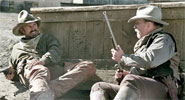
It's common in the Western for an older man to take a younger one under his wing. One thinks of John Wayne and Ricky Nelson in 'Rio Bravo' (1958), of Clint Eastwood and Jaimz Woolvett in 'Unforgiven' (1992). If in 'Open Range' Charlie Waite (Kevin Costner) is hardly a callow youth, his relationship to Boss Spearman (Robert Duvall) is respectful, even deferential.
Boss takes the lead, not only in choosing the tactics in their fight against their enemies but even to the extent of bullying the tongue-tied Charlie into proposing to Sue (Annette Bening). But they are not quite father and son. In effect Boss already has, in the young boy Button, an adopted son, and his relationship to Charlie, as he himself remarks to Sue, is more like a marriage in which each of them bickers about the other while knowing full well the affection in which he is held.
As in many marriages, there are secrets. They have been together for ten years but only now does Charlie relate the traumatic history of his Civil War experience and discover that Boss' real first name is Bluebonnet. And Charlie's marriage to Sue, it appears, will not separate them, for Boss announces that he will quit cowboying and settle down in the same town.
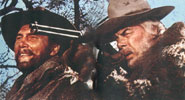
Nobody gets to be a cowboy for ever," says Chet (Jack Palance) to his friend Monte (Lee Marvin). He has just dropped a bombshell: that he's leaving the ranch where they work and moving into town to marry the widow of a hardware merchant. Monte attends Chet's wedding but his heart isn't in it and he feels let down. Until that point in the film the two have been inseparable, fighting, drinking and working together, and Monte has been under the illusion that their relationship was central to their lives. Certainly Monte's own affair with local whore Martine (Jeanne Moreau) has posed no threat, with Monte determinedly keeping it casual ("Cowboys don't get married. Unless they stop being cowboys").
Jack Schaefer's original novel has something in common with his earlier work 'Shane', in which the central relationship between two men similarly overshadows heterosexual commitments. When Shane's attraction to Marian, the wife of his friend Joe Starrett, threatens their friendship Shane buries his feelings for her and rides off alone.
But in 'Monte Walsh' the male bond is ruptured, first by Chet's marriage and then by his death during a robbery. At the end of the film Monte repeats word-for-word a conversation he has had with Chet at the beginning, but this time he's literally talking to himself, a sadder and older man, if not perhaps much wiser.
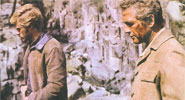
You have to wonder whether the character of Etta (Katharine Ross) was injected into the story by scriptwriter William Goldman as a way of deflecting suspicions that the relationship between Butch Cassidy (Paul Newman) and the Sundance Kid (Robert Redford) might be too close for comfort. It's true that she's based on a real person, but the film is not greatly weighed down by historical verities. So it's hard to escape the feeling that Etta is dragged down to South America by the pair in order to provide them with cover, and indeed this is the very phrase Sundance uses when he outlines the plan he and Butch have hatched. Her role is clear: she mustn't whine, will darn their socks and not get in the way.
Every time Sundance talks to Etta, Butch seems to pop up nearby, as if monitoring their conversations. Butch is friendly to Etta but there's never any sense that it's a ménage à trois: the two boys are too wrapped up in each other for that. Just before they discuss Bolivia Butch and Sundance have leaped over the cliff together into the raging torrent below, if not quite holding hands then all but. In their relationship they seem to take on stereotypical male and female roles: Butch is the thinker and decision-maker and Sundance the intuitive one who waits for Butch to take the initiative. In the freeze-frame that ends the picture the two are still together, united in death as in life.
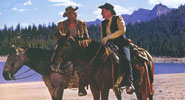
From the start of 'Ride the High Country' it's clear that the relationship between Gil Westrum (Randolph Scott) and Steve Judd (Joel McCrea) goes back a long way. But they have drifted apart and now have different takes on the hand life has dealt them. Steve maintains his moral principles ("All I want is to enter my house justified") but Gil has grown cynical and plans to steal the gold he and Steve have been paid to guard. Yet as with any old-established couple, a bond holds them together even as they appear to be set on a collision course.
On their journey up to the miners' camp they are accompanied by a young man and a young woman who fall into the role of surrogate offspring. Both Steve and Gil mentor the young people, offering advice, correcting their faults, getting them out of scrapes. Neither Steve nor Gil has a sexual relationship in the film and their pairing seems to occupy all their emotional energy. In the final scene, when Gil suggests the two stand up together against the bad guys, he calls Steve 'partner' - a common term of affection in the Western, but significant even so.
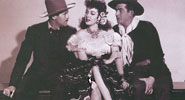
The bond between Wyatt Earp (Henry Fonda) and Doc Holliday (Victor Mature) is based on the principle that opposites attract. Earp is upright and uncomplicated, a man with strong family ties who is committed to law and order. Holliday is essentially a loner, an educated man who has tried to lose himself in the frontier and run away from civilisation and its discontents. Holliday has almost lost his self-respect, destroyed by his addiction to whisky and gambling; Earp, untroubled by self-doubt, inspires others to rise above themselves. Holliday is a ladies' man, pursued by the fiery Chihuahua, half-Indian, blowsy and treacherous, and Clementine, the shy, delicate girl from the east. Earp on the other hand is awkward around women, as Clementine observes ("I don't think you know too much about a woman's feelings, marshal").
It's clear from their first edgy eyeing-up of each other in the saloon that Earp and Holliday respond powerfully to what the other can offer. Holliday resents Earp giving him advice but respects the other's moral commitment. Earp doubts Holliday's reliability but is impressed by his intelligence and erudition.
In allowing Holliday to join in what is in effect a family quarrel at the OK Corral Earp offers him a symbolic celebration of their bond. And Earp's engagement to Clementine after Holliday's death can be read as evidence of his desire to preserve the relationship beyond the grave.